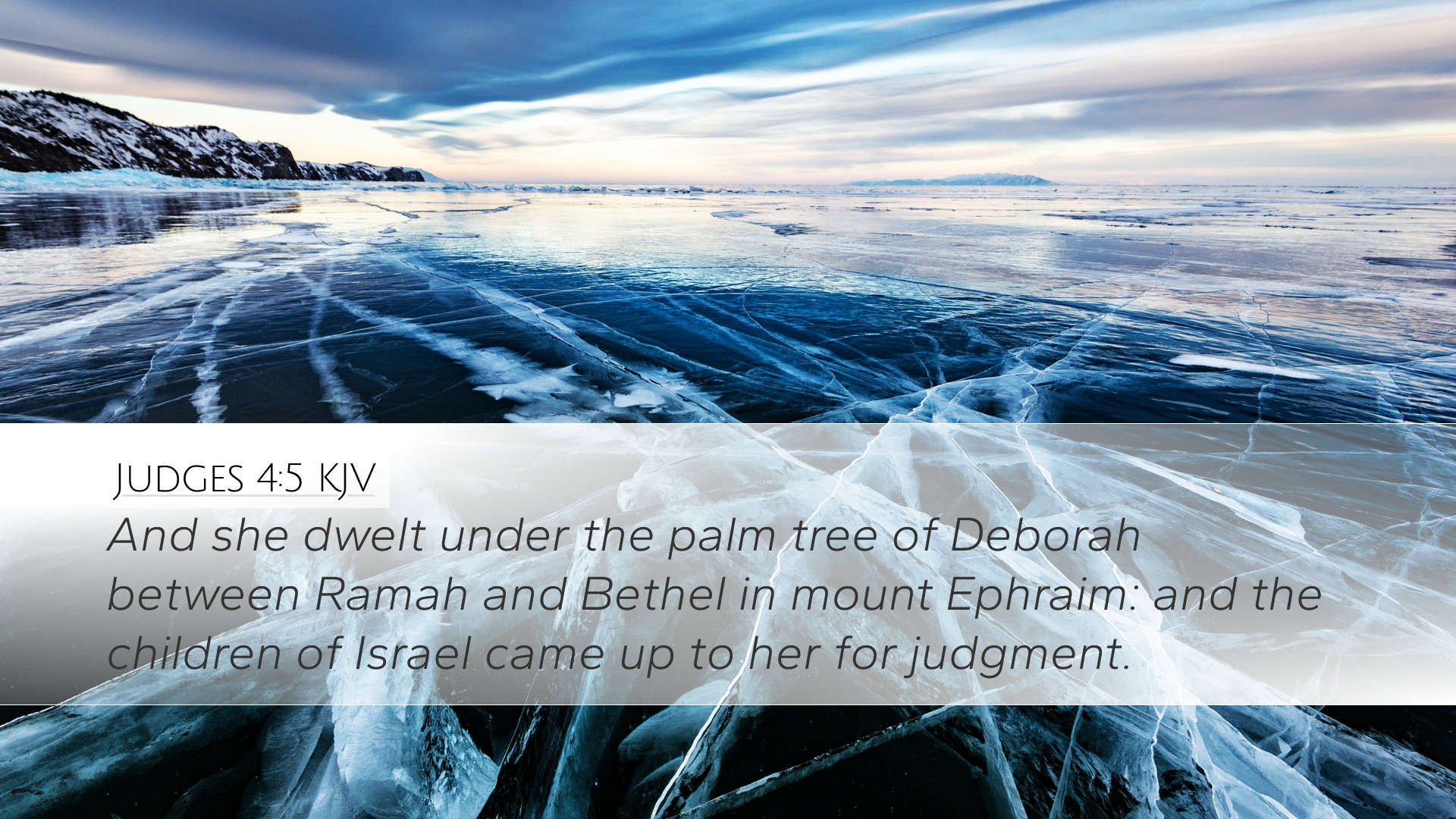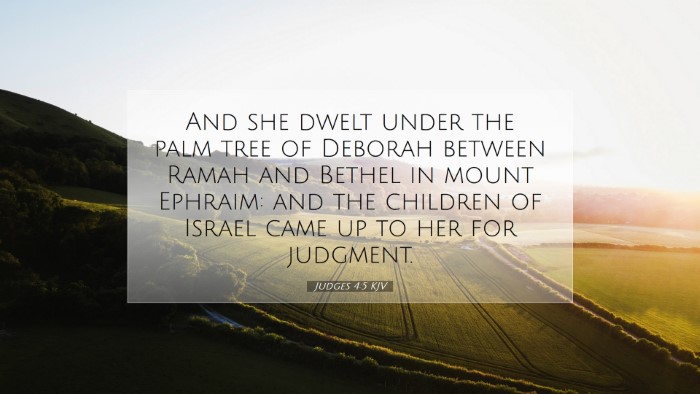Old Testament
Genesis Exodus Leviticus Numbers Deuteronomy Joshua Judges Ruth 1 Samuel 2 Samuel 1 Kings 2 Kings 1 Chronicles 2 Chronicles Ezra Nehemiah Esther Job Psalms Proverbs Ecclesiastes Song of Solomon Isaiah Jeremiah Lamentations Ezekiel Daniel Hosea Joel Amos Obadiah Jonah Micah Nahum Habakkuk Zephaniah Haggai Zechariah MalachiJudges 4:5
Judges 4:5 KJV
And she dwelt under the palm tree of Deborah between Ramah and Bethel in mount Ephraim: and the children of Israel came up to her for judgment.
Judges 4:5 Bible Commentary
Bible Commentary on Judges 4:5
Judges 4:5 states, "She dwelt under the palm tree of Deborah between Ramah and Bethel in mount Ephraim: and the children of Israel came up to her for judgment."
Introduction
This verse introduces Deborah, a significant female leader in Israel, illustrating not only her role as a prophetess and judge but also the social dynamics of ancient Israelite society. The palm tree symbolizes wisdom and security, serving as a place of gathering for the people seeking counsel from Deborah.
Contextual Background
Understanding the historical and geographical context of Judges 4:5 is vital. The period of the Judges was marked by a cyclical pattern of Israel's disobedience, oppression by foreign nations, repentance, and deliverance. Deborah arises as a notable figure during a time of crisis for Israel, indicating God's providence in raising leaders who align with His purposes.
Geographical Significance
Deborah's location between Ramah and Bethel in the mountainous region of Ephraim is emblematic. These areas were strategically important in the tribal allotments of Israel. The choice of a palm tree suggests a place of refuge and a space where the office of judgment could be administered in a serene environment.
Commentary Insights
Matthew Henry
Henry emphasizes Deborah’s authority and the respect she commanded among the Israelites. He notes that her dwelling under the palm tree symbolizes her role in providing spiritual and judicial leadership. The palm tree serves as a reminder of God’s provision, reflecting the flourishing of Deborah’s leadership as well as the health of the community seeking guidance.
Albert Barnes
Barnes highlights the importance of Deborah’s prophetic calling. He comments that her position attracted people from various tribes, suggesting that her influence extended beyond her immediate locality. This verse represents not just Deborah’s personal character but also indicates God’s broader plan of unity and deliverance for the nation of Israel through her leadership.
Adam Clarke
Clarke provides an analysis of the social implications of Deborah’s role. He points out that her leadership as a woman in a patriarchal society indicates a significant divine orchestration. Clarke suggests that the palm tree, representing peace and rest, symbolizes the state of Israel under her wise guidance, contrasting with the turmoil they faced from their oppressors.
Theological Implications
Judges 4:5 serves as a rich text for theological reflection. It raises questions about women in leadership within the church and society at large. The passage invites an examination of the broader biblical narrative where women also play crucial roles, seeing divine empowerment across gender lines.
Divine Appointment
Deborah's story is a testament to divine appointment and the unexpected ways God operates through individuals. Her rise is reflective of God's sovereign choices to lead His people, demonstrating that leadership, wisdom, and guidance come from God’s direction rather than mere societal norms.
Community and Leadership
This passage also speaks to the importance of community in seeking justice. The gathering of the Israelites under Deborah’s palm tree illustrates the collective need for righteous judgment, showcasing a model for communal involvement in decision-making processes that align with God’s will.
Practical Applications
- Encouragement of Women in Leadership: The inclusion of Deborah in the biblical narrative encourages the affirmation of women in roles of leadership within faith communities.
- Seeking Godly Counsel: As the Israelites sought Deborah for judgment, believers today are reminded to seek counsel from wise, godly leaders in their communities.
- Understanding God's Guidance: The story emphasizes the importance of recognizing and respecting those whom God has appointed to lead, regardless of societal constructs.
Conclusion
Judges 4:5 presents a profound moment in Israel’s history through the figure of Deborah. Her leadership exemplifies qualities of wisdom, courage, and divine purpose, which are relevant for modern readers. As pastors, students, theologians, and scholars reflect upon this verse, it serves not only as a historical account but also as a source of inspiration and a call for inclusive leadership in spiritual matters.


